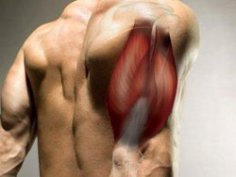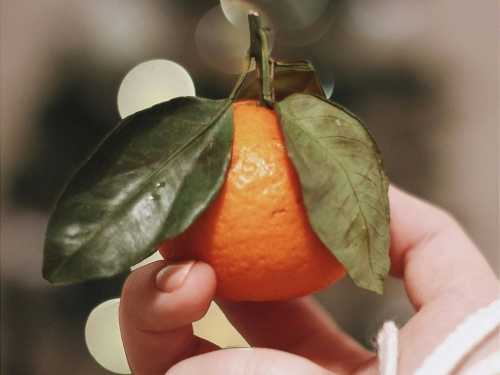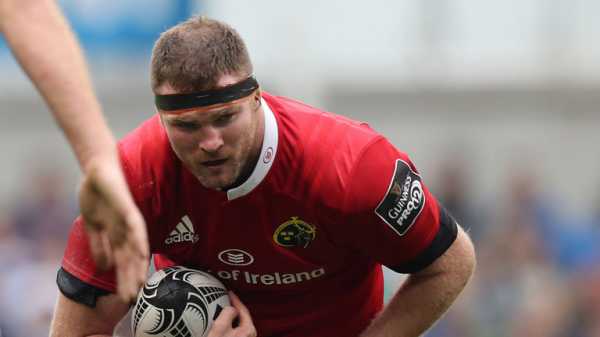
Racing 92’s Donnacha Ryan chats to Sky Sports about life in France, his late coming to rugby, leaving Munster and fears for the future.
To think of Donnacha Ryan the rugby player, the physical stakes immediately spring to mind. On-field aggression. An amalgamation of heart and brawn.
He’s possibly the antithesis of everything surrounding him at the U Arena. Its glitz and glamour. Spotlights and sound systems.
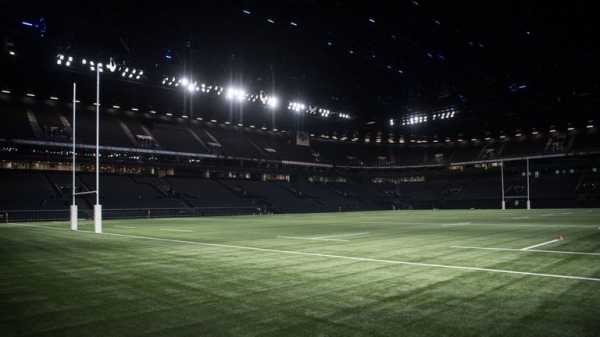
Having taken a leap into this Terra Incognita last summer, his first experience of the stadium was, fittingly, a Rolling Stones concert in October. Before that, thoughts of it had been only of a plastic figurine at Racing’s Le Plessis-Robinson training base.
“It is very different,” he notes with a smirk of incredulity. “When the guys turn up to training, they are dressed as if they’re going to a nightclub. I’d be a long way from that!
“When you’ve got guys going off to fashion week and the Grand Tasting – a wine tasting thing in the Louvre – it’s poles apart from the norm.”
Having spent six months in the French capital, Ryan’s manner is of a man thoroughly enjoying the vastly different culture surrounding him.
He talks of two-hour long lunches, a uniquely Parisian flavour of road rage, of slaloming through traffic on his Peugeot scooter and the heightened emotion of the French public during sporting occasions.
“I really came in head first,” he says excitedly. “I was constantly telling myself I wanted to buy-in massively and when I came over with my partner Jen we said we’d try all the French food.
“But I tried this Andouillette thing in a restaurant. It’s a French delicacy. A sort of sausage. And literally, I’ve never eaten something so horrific in all my life.
“I don’t know if you’ve ever seen the Mr Bean episode where he gets Steak tartare. I was that guy trying to hide this thing from the chef, who kept coming back out to me to see how it was!”
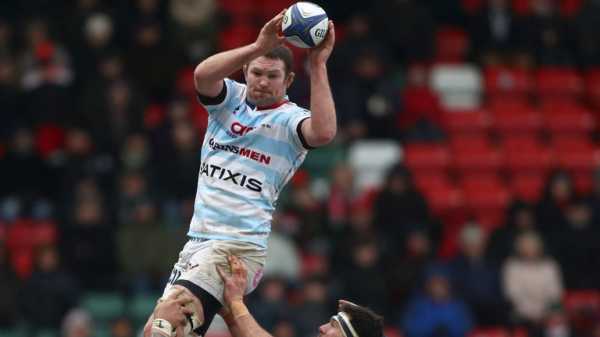
Having initially studied Commerce and German at University College Cork – for which he, rather amazingly, rejected the first offer of a Munster development contract to complete – he swapped German for Irish so as to avoid having to spend a term in Germany.
“And here I am now in France!” he says laughing, recognising the irony.
Such relocation back in the early 2000s would have meant, of course, he would have stood little to no chance of making it with Munster. But, in Ryan’s case, the future was never meant to incorporate a life in rugby anyway.
**********
The youngest of four, Ryan’s was an immensely sporting upbringing in Nenagh, County Tipperary, alongside sisters Joanne, Isabel and Emma.
His father Matt, from Rearcoss, County Limerick, worked as a dairy manager until his retirement, while also an accomplished hurler for Limerick and Laois.
Mother Pat, from Dundalk, worked as a nurse and was once a neighbour of footballer Steve Staunton – “her little claim to fame,” Ryan adds. She set up a swimming club in Nenagh.
Between the ages of six and 14, Ryan swam almost every day. Within the trust of his small community, he would regularly be in possession of keys to the pool, training before school.
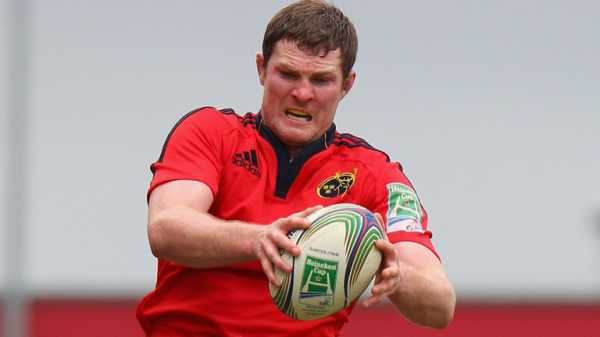
Ryan engaged in a horde of other sports too: Golf, Gaelic football, hurling, football, squash, basketball, athletics, cross country running.
“Anything to get a day off school,” he quips. Anything, it seems, bar rugby.
Hurling proved his childhood love. He reminisces of playing for Éire Óg GAA club in Moneygall, a university trial in Mardyke alongside future Kilkenny hurler Michael Rice, of watching his father play.
“I found it hard to separate myself from hurling,” he confesses. “Even after I’d started playing rugby and was with Munster, I snuck back to play the odd game.
“I knew exactly in my head that I shouldn’t have been playing, but I just loved it.
“My dad used to bring me to hurling matches in Tipp and Limerick, and I used to bring my hurley and boots just in case they’d look up in the stands, see me and say: ‘There he is! He’s ready to go!'”
He candidly acknowledges he possibly lacked the desired skill to make it in hurling, and as he grew older, he struggled to put on weight. It was this, implausibly, which first attracted him to rugby at the age of 17.
“I started playing rugby to bulk up for other sports, which is the truth,” Ryan says. “I was tiny, really skinny.
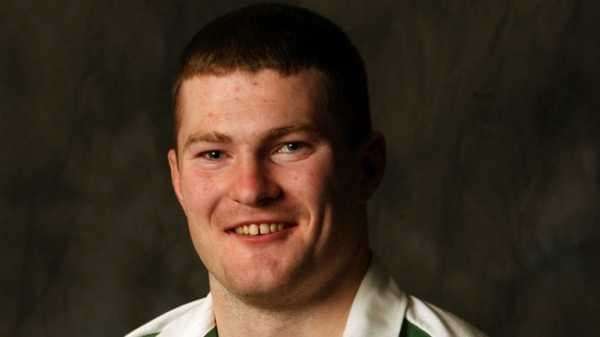
“The rugby club was literally half a mile from my house, I was never in there until I hit 17. I never had any interest in turning down that side of the road.
“I’d watched rugby matches before but I’d never understood it. I’d seen Simon Geoghegan play but the thing was, I couldn’t really sit still and watch a full match – any match of any sport for that matter.”
Three events proceeded to conspire and change such an outlook. All of which occurred within 12 months.
The first, at home in his parents’ living room, transpired as he caught a glimpse of Munster v Saracens in January 2000.
Deep into injury-time, Keith Wood barrels over in front a fervent and rapturous Thomond Park. A young Ronan O’Gara clips the conversion over via the upright to secure a 31-30 victory.
A teenaged Ryan stands “amazed” at what he’d witnessed.
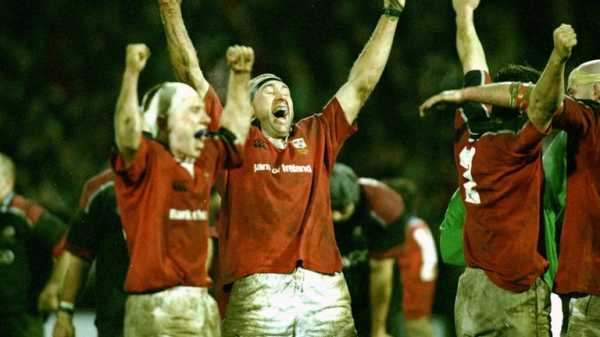
The second event, saw current Sky Sports pundit Alan Quinlan – another Tipperary native – pay a visit to a Nenagh rugby trial.
Among the youths he was addressing was Ryan.
“I was there thinking to myself: ‘I’ve seen this guy on TV playing for Munster, in front of a full stadium, and he’s within touching distance here. This guy is from here. I’m from Tipp. It’s a plausible option’.
“I thought that was incredible. These guys are human, and that sort of career is within touching distance. It can happen.”
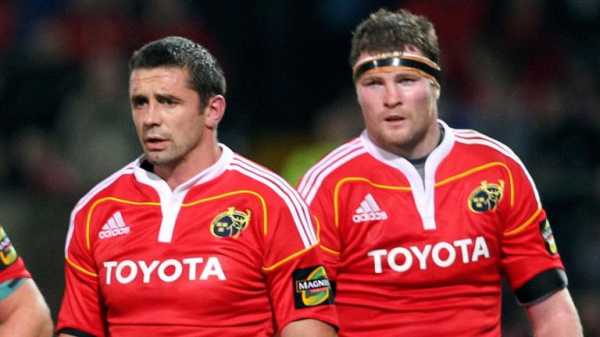
Around the same time, a coach by the name of Pat Whelan took Ryan under his wing, teaching him the laws of the game, delightfully, with Subbuteo characters.
Together they sat down and planned any potential route into the sport in detail, all the way to potential exit strategies decades down the line.
And all of this a mere year after he’d first picked up an oval ball.
“Pat was a great mentor for me,” he says. “He introduced a concept of goalsetting.
“Everybody does goalsetting now, but at the time it wasn’t really something that was spoken about where I was from.
“My dad, Pat and I discussed whether I’d give rugby a go when I was 18. We put a plan in place and said if by the time I hit 25 I wasn’t a professional, I’d leave the game. That was the target point we all agreed.
“Pat has been tremendous for me. I certainly wouldn’t be here only for him.
“There were times when I didn’t think I should have been anywhere near the Munster U18s, but he gave me the confidence to be able to do it and luckily I came through.”
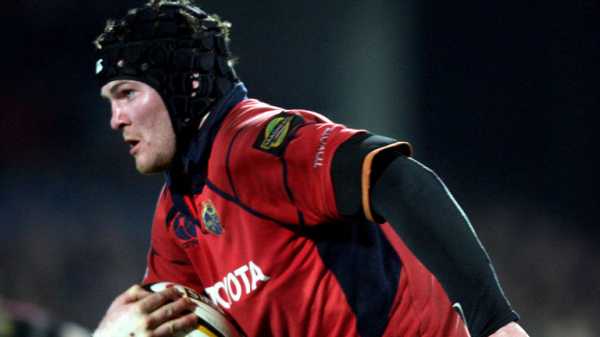
**********
An extra bite develops in the breeze come October time. The colour of trees slowly begins to riot as leaves rustle clear in the ever increasing chill.
Trees are not yet skeletal – they won’t be for some time – but cautionary signs emerge that winter is not long thus.
It’s a time of the year when rugby folk in the province of Munster come alive.
A time of the year when the European Cup clicks into gear for another campaign.
For two decades, supporters from Limerick and Cork, Tipperary and Kerry, Waterford and Clare have adhered to a near sanctified rugby theology. They’ve fanatically espoused their province to the apex of the European game.
Indeed, the European Cup induces an overwrought thirst in these parts. October 2016 is no different as Munster take on Racing 92 in week one…
The players and staff book into the Novotel Hotel in Suresnes, west Paris.
The night before the match, Donnacha Ryan heads up to bed at 9.30pm. With him in the lift are back-row Jack O’Donoghue, nutritionist Catherine Norton and head coach Anthony Foley.
He’s not to know it, of course, but unthinkably, it’s the final conversation he will share with his former team-mate, coach and friend. It’s one of the last Foley will share with anyone.
“He was on the same floor as me and we were chatting about the meal the management had gone out for and how great it was,” Ryan recounts.
“They had been talking about going for a run in the morning and Axel said: ‘I’ll leave them off!’ as we headed to our rooms.
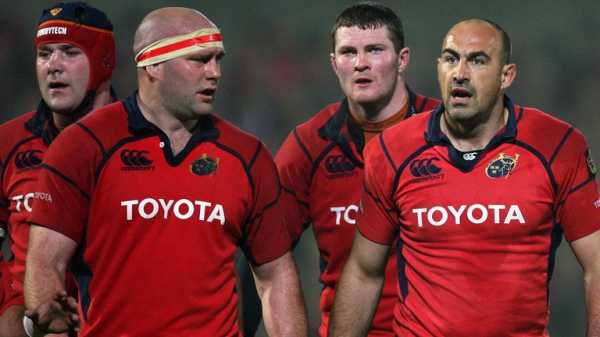
“The next day I remember we didn’t see him at breakfast and were doing lineout drills in the car park.
“I said to Jerry Flannery: ‘Where’s Axel? Jesus he’d never miss this’.
“‘George [Murray, Munster analyst] has gone looking for him, he’s probably got the time wrong because of the time difference,’ Flannery responded.
“We went through the lineouts and Fla spoke very well to narrow the focus for guys playing.
“When we went back in, there was a commotion. People were looking for the doc. And then looking for his bag. Lads all around were rattled. Something serious was up.”
Team manager Niall O’Donovan rings and re-rings Foley’s mobile and room number, but no response is forthcoming. George Murray bangs his door down until such time as a hotel porter lets him in.
Doctor Tadhg O’Sullivan soon confirms the news that Foley has passed away in his sleep at just 42 years-of-age. An impossible notion to believe at first.
“We were all in a team room when the news was broken to us,” Ryan adds, his voice noticeably softening. “It was devastating to be honest with you.
“We all had to stay in the room until they had contacted everybody. They brought in his father Brendan. A minister was also brought in to say a few prayers.
“Rog [Ronan O’Gara] called over soon after. It was a really strange feeling, just devastation in the room.
“I didn’t contact anyone. A few lads were a little ropey in the room and needed to be chatted away with. It was a heavy enough day.
“The week that followed showed how big a family Munster was. It was unbelievable, incredible.”
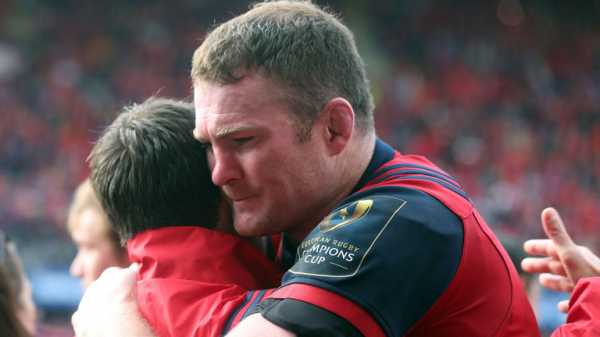
Several of the Munster players involved that season have since spoken of a shift in mindset in the aftermath of that tragic day.
Keith Earls, Conor Murray and Simon Zebo have publically noted the collective sense of perspective which dawned over the squad.
It was as if the pressure of past glories upon their shoulders had lifted somewhat. Stress was replaced by enjoyment and results followed.
“Absolutely. It was one of my most enjoyable years playing,” Ryan says.
“I remember that Glasgow week people were making mistakes in training, and normally lads would have been completely on edge with others guys.
“But everyone was saying: ‘Don’t worry about it’. That week we’d gone to the funeral and met up with some of the old heads of the province.
“The stories they were sharing were hilarious. They’d moved on from playing the sport, but they were still very tight and I think a lot of the younger lads saw that.
“And though some might have been keeping tabs on rugby, sometimes it’s a sore subject for them because they might not have finished on the best of terms, either with Munster or because of injury. But it all came back to them and there was a collective: ‘I miss this’.
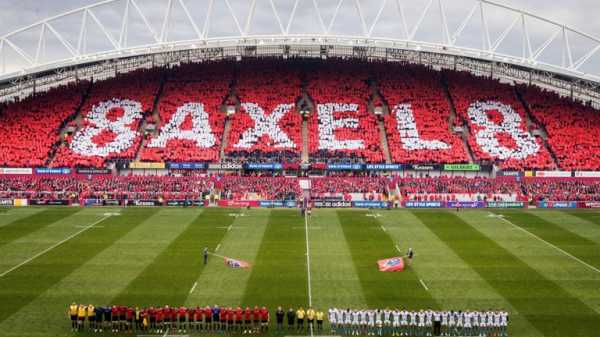
“It was horrible to have them meet up like that, but it was great to see them and we started heading out together a bit more as a group too.
“You don’t get to do it a lot in the professional game because the second you are off the pitch, you’re thinking of recovery. Your body is your business, you need to do it.
“It was such an empowering work environment. We got the most out of each other and made everyone better players.
“There were so many wins in the past we never enjoyed, we never celebrated. And they just pass you by then.
“You don’t remember hitting rucks, it’s the craic you remember most in the dressing rooms and the huddles.
“I love that and I miss that – the Munster one. That’s my big highlight more than rugby.”
**********
Despite that genuine strength of feeling, 13 months later Ryan was playing against Munster for Racing.
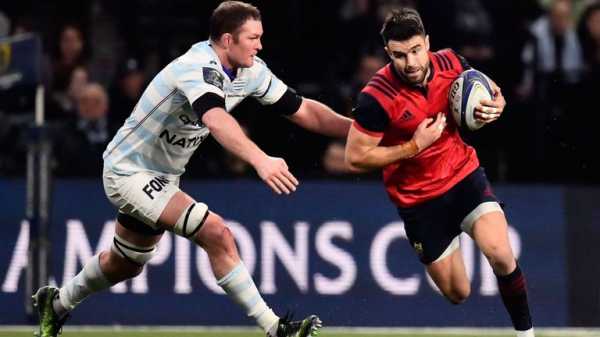
His exit was a somewhat controversial one. He confirms there was no offer of Central Contract renewal from the IRFU, but is philosophical about the rest, stressing his decision to leave, in the end, was not monetary.
“The reality is, they [IRFU] are looking at the future and running a business,” Ryan says. “For any player going for negotiations, it’s a difficult time because you are walking the tightrope of being injured.
“I’d love to be playing for Munster and Ireland forever. But the difficulty is when the emotional connection of all that and the sacrifices other people have made have to be taken into account as well.
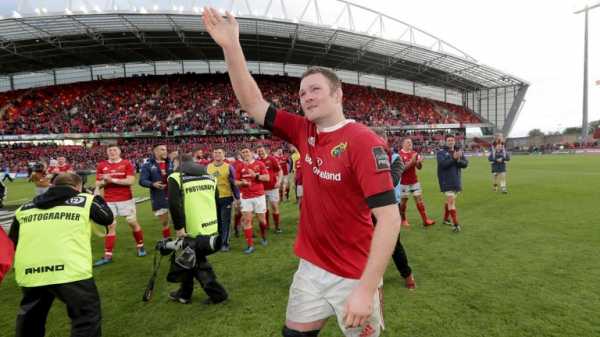
“You realise it’s always going to be a difficult ending anyway but from my point of view, it was a chance to go and have this opportunity.
“I could have left twice before to Northampton [2012] and Perpignan [2014]. I was never really keen on going but it was a nature of circumstance I suppose. You have to do the whole circus game.
“I have no interest in doing it, but unfortunately that’s the way you have to do it as a player – get another pony into the ring.
“Part of professional rugby is having to do those things. For me, I hated having to do it. One year I had four clubs knocking on the door and then I dislocated my shoulder and lost all the options.
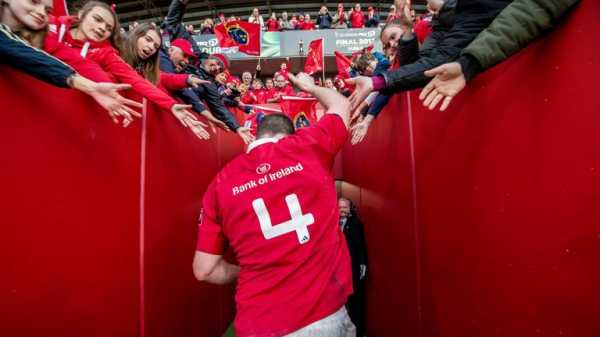
“Having gone, even though it’s tough, I look back and think it was a blast, I appreciate Munster more. My love for it has actually grown and I’m so grateful.
“I could whinge and moan, but you have to be a big boy and make decisions.
“Not playing for Ireland while I’m here is a policy I agree with. The most important thing is encouraging and inspiring guys on the island.
“You’d always love to be playing for Ireland but I’ve made peace with it.
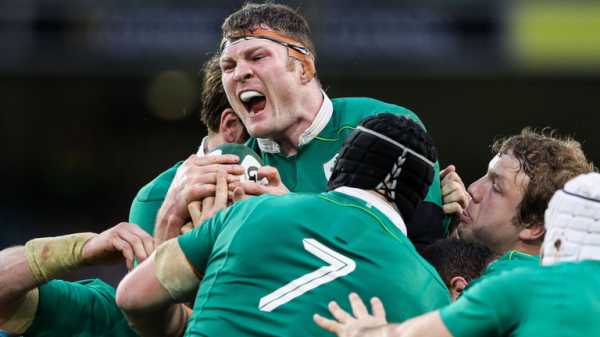
“You have to enjoy the memories that you’ve had and not resent watching the lads playing. I love Ireland and supporting Ireland.
“To get one cap for Ireland was a dream. I can’t really be complaining too much.”
**********
Ironically, for someone who couldn’t sit and watch a rugby match until his late teens, Ryan now watches 10 to 11 games a week, describing himself as a ‘student of the game’.
The 34-year-old has a university degree, an interest in geology and been part of an apprenticeship programme involving mortgages and investing for buy-to-let.
Even still, the future concerns him greatly.
“You have to be conscientious about the next step,” he notes. “Lads finish in their mid-30s and I can only imagine they can get a bit lost. Your lifestyle completely changes.
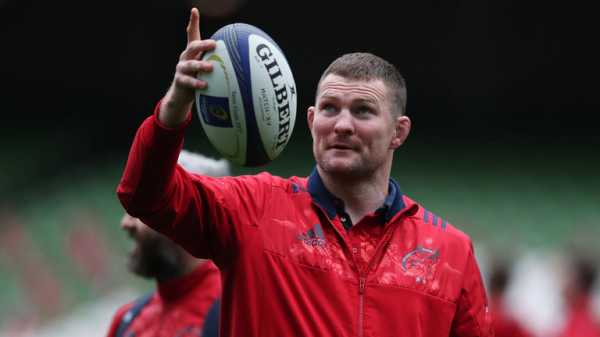
“The mental health of guys is definitely tested. You’re with a group of guys day in, day out, and you’re very tight. And sometimes you can say lads never grow up either, but still, to go from that environment to nothing…
“Take that Saracens semi-final last year. In the 66th minute, the game was on an edge and we had a lineout about seven metres out. I remember we had a huddle, and I would never usually do it, but I looked up and thought: ‘Wow, this is class’. It’s a privilege.
“I’d usually be trying to read them, count numbers, but just waiting for our hooker Rhys Marshall, I looked around and took it all in. Nothing is ever going to hit that height again.
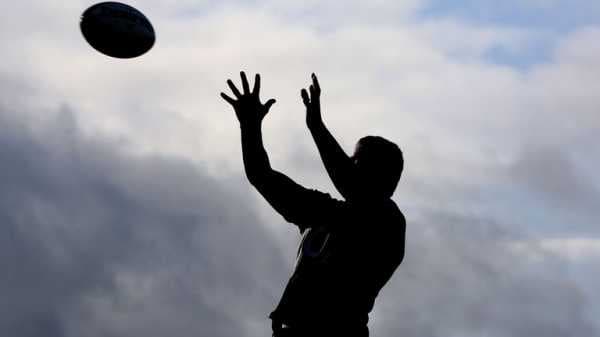
“People say you’ll play until this age or that, but the reality is there’s consequences for playing on longer as well.
“I know lads now after a few years out of the game struggling massively, and you’ve just got to weigh that up. Are you going to be able to do exercise afterwards? Are you going to be able to play with your kids?
“Concussion is a big thing too. The long-term consequences of that are probably still unknown.
“These are the sorts of questions I ask because you should never keep playing just for the sake of playing.”
The future may seem a daunting step into the unknown, but so too was rugby for Ryan once upon a time, and that hasn’t worked out too badly.
Also See:
Sourse: skysports.com
